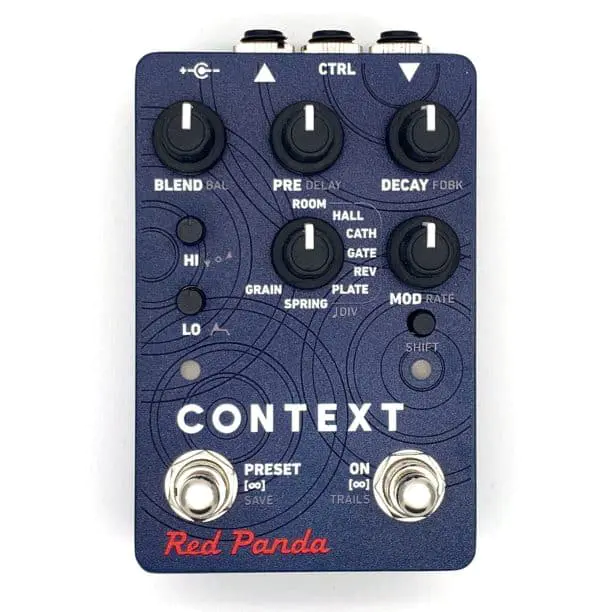
The Red Panda Context V2 is a reverb pedal that can sound both realistic and “out there.”
The new version adds presets, modulation, “spring” and “grain” settings in lieu of “delay.” Plus, stereo input/output, USB MIDI, fully assignable expression pedal, 3 new modes, a delay plus reverb option in all modes, separate high and low-frequency damping controls, modulation, dynamic reverb, and infinite hold. Notably, the Grain mode is a granular reverb inspired by the Ursa Major SST-282 Space Station.
The Red Panda Context v2 is included in our article about the Best Multi Reverb Pedals.
—
Red Panda Context V2, Builder’s Notes
The Context is a reverb pedal inspired by 1980’s rack mount reverbs. It has 8 algorithms, including room, hall, cathedral, gated reverb, reverse reverb, plate, spring, and a granular reverb. Version 2 adds stereo input/output, USB MIDI, fully assignable expression pedal, 3 new modes, delay plus reverb in all modes, separate high and low frequency damping controls, modulation, dynamic reverb, and infinite hold.
The Room, Hall, Cathedral, Gated, and Plate reverb algorithms are updated versions of the Context version 1 reverbs, but now delay is available in all modes. They also has separate low and high damping controls with more range, along with all the other new features.
The modulation knob changes the amount and character of the internal modulation. It gives you a mix of different modulation types from 1980’s and early 90’s reverbs, including chorus modulation, random modulation that keeps the pitch stable, and deep modulated reverbs. Holding down the shift button adjusts the modulation rate.
Reverse reverb fades in louder and brighter over time, giving the impression of playing backwards. Modulation adds a wash of normal reverb.
The spring reverb is not a model of any specific spring reverb. Instead, we designed a spring reverb algorithm using the techniques and algorithms that were used in 1980’s reverbs, but with a lot more processing power available. It gives you the chirp, drip, and feel of a spring reverb with a slight twist. You can adjust the length of the decay, high and low frequency damping. The modulation is tremolo with adjustable intensity and speed.
Grain mode is a granular reverb inspired by the Ursa Major SST-282 Space Station. The SST-282 was released in 1978 and used multiple delay taps with modulation to create reverb effects. The Context can create ghostly reverb effects, slowly sweeping resonances, and at higher modulation settings is a multi-voice granular processor that creates clouds of detuned sound fragments for entirely new reverb sounds.
When the shift button is held down, the top row of knobs adjust delay parameters. The low and high damping knobs adjust dynamics for ducking reverb or an expander for more reverb on louder notes, with adjustable threshold and recovery time. Holding down the foot switches gives you infinite sustain. The left footswitch keeps the input active so that the sound builds up. The right footswitch freezes the reverb with your dry signal playing through.
One preset available on the left footswitch, 127 via MIDI or our remote footswitch. Expression pedal/CV can be assigned to any combination of parameters. We will also have a web-based editor for tweaking and managing your presets.
Designed and assembled in USA. The Context 2 requires a 9 V 250 mA center negative power supply (not included).
—
Algorithms
ROOM – fast buildup, good for thickening sounds
HALL – slower buildup with longer initial delay
CATH(edral) – emulates a large, reflective space
GATE(d) – gated reverb with non-linear decay
REV(erse) – reverse reverb
PLATE – bright, dense studio plate reverb
SPRING – spring reverb
GRAIN – granular reverbControls
BLEND – wet/dry blend (to 100% wet)
PRE – predelay
DECAY – reverb decay
HI – high-frequency damping
LO – low-frequency damping
MOD – modulation amount and characterControls (shift)
BAL – reverb/delay balance
DELAY – delay time
FDBK – delay feedback
v-o-^ – dynamics ducking/off/expander and recovery time
/\-_-_ – dynamics threshold
RATE – modulation rate






















